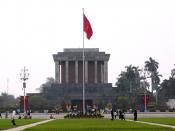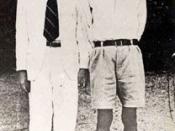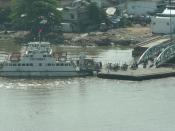Ho Chi Minh once said:
"You can kill 10 of my men for every one I kill of yours, yet even at those odds, you will lose and I will win." as Ho's brilliant commander, General Vo Nguyen Giap, stated in Hanoi in 1990, his principal concern had been victory. When I asked him how long he would have resisted the U.S. onslaught, he thundered, "Twenty years, maybe 100 years -- as long as it took to win, regardless of cost." The human toll was horrendous. An estimated 3 million North and South Vietnamese soldiers and civilians died.
During Ho's childhood he was greatly influenced by his surroundings. This would greatly influence the person that he was to become.
The area was indirectly ruled by the French through a puppet emperor. Its impoverished peasants, traditional dissidents, opposed France's presence; and Ho's father, a functionary at the imperial court, manifested his sympathy for them by quitting his position and becoming an itinerant teacher.
Inheriting his father's rebellious bent, Ho participated in a series of tax revolts, acquiring a reputation as a troublemaker. But he was familiar with the lofty French principles of liberté, égalité, fraternité and yearned to see them in practice in France. In 1911 he sailed for Marseilles as a galley boy aboard a passenger liner.
In 1919, Woodrow Wilson arrived in France to sign the treaty ending World War I, and Ho, supposing that the President's doctrine of self-determination applied to Asia, donned a cutaway coat and tried to present Wilson with a lengthy list of French abuses in Vietnam. Rebuffed, Ho joined the newly created French Communist Party. "It was patriotism, not communism, that inspired me," he later explained.
What he brought was a spirit of rebellion -- against first the French and later the Americans.


